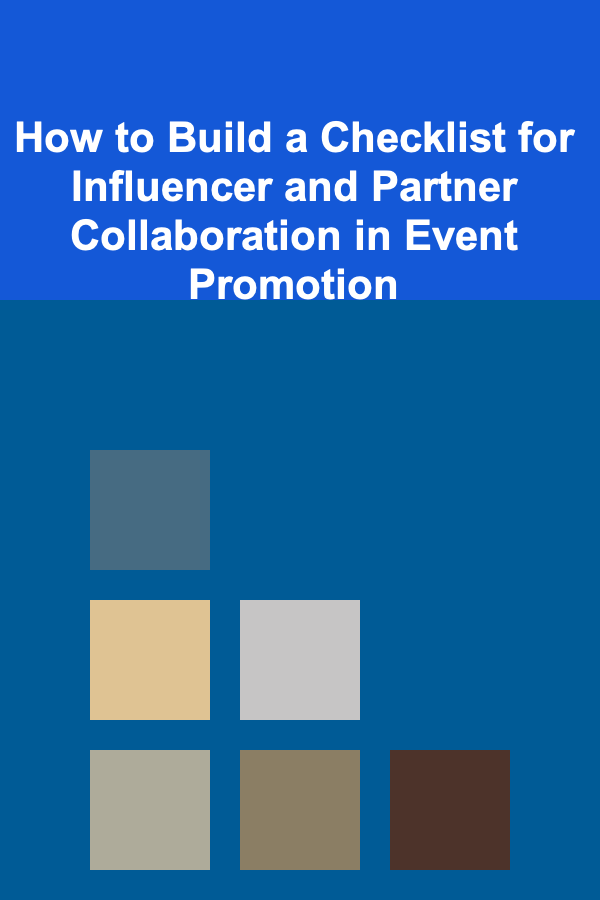
How to Build a Checklist for Influencer and Partner Collaboration in Event Promotion
ebook include PDF & Audio bundle (Micro Guide)
$12.99$7.99
Limited Time Offer! Order within the next:

In today's digital age, collaborating with influencers and partners for event promotion is one of the most effective ways to increase awareness, engagement, and attendance. Whether you're planning a conference, product launch, charity gala, or community event, the right partnerships can amplify your reach and help you achieve your event goals. However, to ensure that these collaborations are successful, it's essential to have a well-structured checklist that keeps everyone aligned and ensures that all tasks are completed on time.
This actionable guide provides a detailed checklist for influencer and partner collaboration in event promotion, helping you streamline the process, maximize your event's visibility, and ensure a smooth partnership experience.
Define Your Event Goals and Key Performance Indicators (KPIs)
Before reaching out to influencers and partners, you need to clearly define your event goals. This will guide your collaboration strategy and help you communicate expectations effectively.
Actionable Steps:
- Set Clear Objectives: Are you aiming to increase ticket sales, drive website traffic, raise awareness, or build your event's reputation? Your goals will influence the type of influencers and partners you engage.
- Identify KPIs : Common KPIs for event promotion include:
- Number of event sign-ups or ticket sales
- Social media impressions and engagement
- Website traffic
- Media mentions
- Influencer-generated content (e.g., blog posts, social media stories, videos)
Knowing what you want to measure will help you assess the effectiveness of each collaboration and ensure that your influencers and partners understand how success will be measured.
Identify the Right Influencers and Partners
The success of your event collaboration depends on selecting the right influencers and partners who align with your event's goals and values. It's important to partner with individuals or organizations that resonate with your target audience.
Actionable Steps:
- Define Your Target Audience: Understand the demographics of your event attendees, such as age, location, interests, and preferences. This will help you identify influencers and partners who already have access to this audience.
- Research Influencers : Look for influencers who:
- Have an engaged and relevant following on platforms like Instagram, TikTok, YouTube, or Twitter.
- Align with your event's theme, values, and tone.
- Have experience in promoting events similar to yours.
- Research Partners : Potential partners can include:
- Companies that share a similar target audience
- Industry associations, media outlets, or community organizations
- Sponsors or vendors offering complementary products or services
Make sure the partners' objectives align with your event's goals for a mutually beneficial relationship.
Establish Clear Collaboration Guidelines
Once you've identified your influencers and partners, it's time to define the details of the collaboration. Establishing clear expectations ensures that both sides understand what's required and when.
Actionable Steps:
- Discuss Roles and Responsibilities : Define what each party will be responsible for:
- Influencers: Will they create content, attend the event, host giveaways, or share posts on social media? Outline the type and frequency of content expected, such as Instagram posts, stories, blog posts, or video mentions.
- Partners: What type of support will they provide? Will they offer products, services, or financial sponsorship? Are they expected to promote the event through their networks, or are they helping with logistics?
- Agree on Content and Messaging: Ensure that the messaging aligns with your event's brand and tone. Provide influencers and partners with key talking points, hashtags, and guidelines to maintain consistency.
- Set Deadlines and Milestones: Outline key dates for content creation, promotional posts, and event reminders. Make sure there's enough time for content to gain traction before the event. Include deadlines for any partner deliverables (e.g., logo placement, booth design, promotional materials).
- Approval Process: Set up an approval process for content, particularly if influencers are creating posts or videos on behalf of your event. Make sure that content aligns with your brand guidelines and provides the necessary information.
Create a Communication Plan
Open and ongoing communication is key to the success of any influencer or partner collaboration. Regular updates ensure that everyone is on the same page and that any issues can be addressed promptly.
Actionable Steps:
- Designate a Point of Contact: Assign a primary contact person from your team to manage communication with each influencer and partner. This will help streamline the process and prevent confusion.
- Set Regular Check-Ins: Schedule regular check-ins to discuss progress, troubleshoot problems, and review any upcoming tasks. These could be weekly calls, emails, or video meetings.
- Share Updates and Resources: Keep influencers and partners informed with event updates, promotional assets, or new developments. Provide them with high-quality images, logos, event schedules, and any other relevant resources that they can use in their promotion.
Consider using collaboration tools such as Google Drive, Slack, or Trello to share resources and track progress.
Define Compensation or Incentives
Compensation is an important part of influencer and partner relationships. Whether you're paying them directly, offering free tickets to your event, or providing them with other incentives, make sure both sides feel valued.
Actionable Steps:
- Influencers : Compensation for influencers can include:
- Monetary payment (fixed rate or commission-based)
- Free tickets to the event or VIP passes
- Products or services from your event sponsors or partners
- Exposure through your event's promotional channels
- Partners : Partners may be compensated through:
- Visibility and promotion at the event (e.g., logo placement, sponsored sessions)
- Co-branded marketing efforts, including social media posts, email newsletters, or media coverage
- Other mutual benefits, such as access to event data, customer leads, or new business opportunities
Be transparent about compensation expectations and ensure that it's clearly outlined in the collaboration agreement.
Track Performance and Adjust Strategy
Monitoring the performance of your influencer and partner collaborations is crucial to understanding what's working and where improvements can be made.
Actionable Steps:
- Monitor Content Performance: Use analytics tools to track the performance of influencer and partner-generated content. Measure impressions, engagement, and referral traffic.
- Collect Feedback: Ask influencers and partners for feedback on the collaboration process. Did they encounter any challenges? Were there any areas for improvement?
- Adjust the Strategy: If you notice that certain types of content or promotional tactics are more effective, adjust your strategy accordingly. You can experiment with different posting times, content formats, or messaging based on what resonates best with your audience.
By tracking and analyzing performance, you can continually optimize your collaborations for future events.
Evaluate the Partnership Post-Event
After your event concludes, it's important to evaluate the success of your collaborations and identify areas for improvement. This will help you build stronger partnerships for future events.
Actionable Steps:
- Measure Results Against KPIs: Evaluate whether your event goals were met based on the KPIs you set earlier. Did you achieve your target ticket sales, social media impressions, or engagement metrics?
- Thank Influencers and Partners: Show appreciation for the contributions of your influencers and partners. A thank-you email, a social media shout-out, or an offer for future collaboration can go a long way in maintaining positive relationships.
- Review the Experience: Discuss the overall experience with your influencers and partners. What went well? What could be improved for future collaborations?
Conclusion
A well-structured checklist for influencer and partner collaboration is essential for the successful promotion of any event. By clearly defining your goals, selecting the right influencers and partners, setting clear expectations, and maintaining open communication, you can maximize the impact of your event's promotional efforts. Regularly evaluate your collaborations to learn from each experience and continue refining your strategies for even greater success in the future.

How to Create a Functional Mudroom with Effective Storage Solutions
Read More
How to Organize Legal Documents for Easy Access
Read More
How to Properly Clean and Care for Your Washing Machine
Read More
How to Protect Your Home from Carbon Monoxide and Gas Leaks
Read More
Why Creating a Vision Board for Organization Goals Inspires Action
Read More
How To Master Violin Vibrato and Intonation
Read MoreOther Products

How to Create a Functional Mudroom with Effective Storage Solutions
Read More
How to Organize Legal Documents for Easy Access
Read More
How to Properly Clean and Care for Your Washing Machine
Read More
How to Protect Your Home from Carbon Monoxide and Gas Leaks
Read More
Why Creating a Vision Board for Organization Goals Inspires Action
Read More